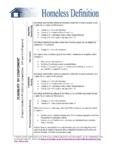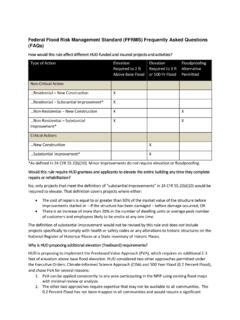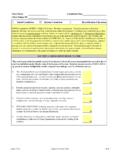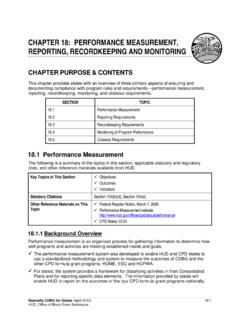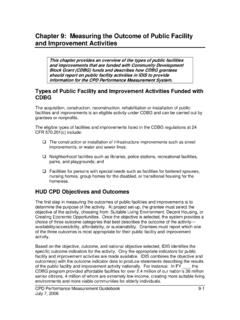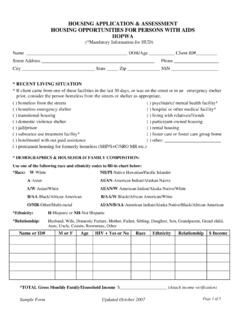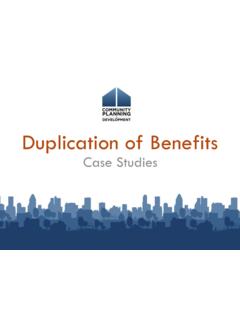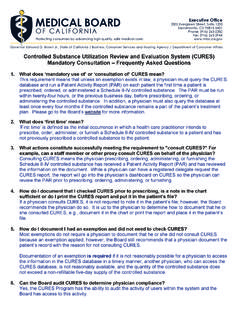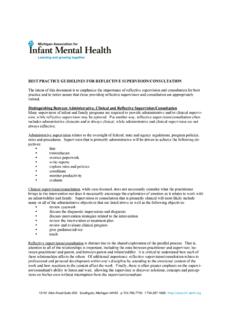Transcription of Process for Tribal Consultation in HUD Projects - HUD …
1 1. Department of Housing and Urban Development Community Planning and Development _____. Special Attention of: Notice: CPD-12-006. All Regional Directors All Field Office Directors Issued: June 15, 2012. All CPD Division Directors All Regional Environmental Officers Expires: This Notice is effective until All Responsible Entities amended, superseded, or rescinded. All Housing Directors _____. All PIH Division Directors Cross References: All Program Environmental Clearance Officers _____. SUBJECT: Process for Tribal Consultation in Projects That Are Reviewed Under 24 CFR Part 58.
2 _____. I. Purpose The Environmental Review Procedures for Entities Assuming HUD Environmental Responsibilities, 24 CFR Part 58, outlines the review Process for many Projects assisted with HUD programs, including those funded through CDBG, HOME, HOPE VI, HOPWA, Emergency Shelter Grants, certain Indian Housing programs, Public Housing Capital Fund, and Economic Development Initiative grants, and certain loans guaranteed by HUD. Part 58 covers many environmental areas, including historic resources. It references the Section 106 review Process for historic resources, which requires federal agencies to consult with federally- recognized Indian tribes on Projects that may affect historic properties of religious and cultural significance to tribes.
3 Under Part 58, local, state, or Tribal governments become Responsible Entities (REs) and assume the federal agency's environmental review authority and responsibility for Projects within their jurisdiction, including those for which they are grantees. The RE must consult with tribes to determine whether a proposed project may adversely affect historic properties of religious and cultural significance, and if so, how the adverse effect could be avoided, minimized or mitigated. This applies to Projects on and off Tribal lands. This Notice clarifies the steps that REs should follow in the Tribal Consultation Process .
4 Following this protocol ensures compliance with the requirement for certification of Tribal Consultation on the Request for Release of Funds and Certification (form HUD ). II. Background Section 106 of the National Historic Preservation Act (16 470f) and its implementing regulations (36 CFR Part 800) direct federal agencies to undertake an open, consultative Process to consider the impact of their Projects on historic and archeological resources. The review must 2. be completed before an agency approves and/or commits funds to a project. In Projects that are reviewed under 24 CFR Part 58, the Responsible Entity (RE), acting as HUD, consults with the State Historic Preservation Officer (SHPO), local government, individuals and organizations with demonstrated interest, the public, and representatives of federally-recognized Indian tribes and Native Hawaiian Organizations, including Tribal Historic Preservation Officers (THPOs).
5 This Notice focuses on Tribal Consultation and project impacts to historic properties of religious and cultural significance to tribes. If a project includes activities that may affect such properties, the RE must consult with tribes to identify the property(ies) and consider ways to avoid, minimize or mitigate possible adverse effects to them. For guidance on consulting with Native Hawaiian Organizations, see Consultation with Native Hawaiian Organizations in the Section 106 Review Process : A Handbook published by the Advisory Council on Historic Preservation in June 2011. Effective Tribal Consultation begins at the earliest possible stages of a project and is carried out to meet project timeframes.
6 It fosters meaningful dialogue that strives to protect historic properties of religious and cultural significance to tribes. As noted in 36 CFR (c)(2)(ii)(B): Consultation with Indian tribes should be conducted in a sensitive manner respectful of Tribal sovereignty. Nothing in this part alters, amends, repeals, interprets, or modifies Tribal sovereignty, any treaty rights, or other rights of an Indian tribe, or preempts, modifies, or limits the exercise of any such rights. Additional guidance on working with Tribal representatives is available. REs may engage cultural resource specialists to assist in the Process as needed, but REs remain ultimately responsible for initiating Consultation with tribes.
7 Further details on the Statutory and Regulatory Requirements for Tribal Consultation are included in Section VI. Definitions are included in Section VII. III. Required Actions by Responsible Entities A. Determine if Section 106 Review is Required Not all Projects require Section 106 review. Some are exempted through regulation or Programmatic Agreements between the RE and the SHPO. If Section 106 review is not required, Tribal Consultation is not required. 1. Exempt Activities If project activities are limited to those listed in 24 CFR (a) (1-11) as Exempt Activities and those listed in 24 CFR (b), as Categorical Exclusions not subject to , no further review and no Consultation are required.
8 The listed Activities and Exclusions have No Potential to Cause Effects. Examples include: maintenance activities, tenant-based rental assistance, operating costs, affordable housing pre-development costs, studies and plans. 2. Programmatic Agreement If the funded activity is covered by an existing Programmatic Agreement (PA), the PA may contain more Exempt activities in addition to the ones above. [Link to PA database] Follow the review Process in the PA, including appropriate Tribal Consultation . If the PA does not 3. contain a section on Tribal Consultation , and the activity is not Exempt, follow the Process in III.
9 C., below. 3. Projects Involving Multiple Federal Agencies If the project involves multiple federal agencies, the RE may defer to another federal agency as the lead agency to undertake the Section 106 review. Generally, the agency with the largest stake in the project acts as the lead agency. Document the lead agency agreement in writing and retain it in the Environmental Review Record (ERR). The agreement must contain provisions for appropriate Tribal Consultation . If adverse effects are involved, the RE. must sign the Memorandum of Agreement that resolves the adverse effect(s).
10 Contact the HUD Federal Preservation Officer to discuss questions about a specific case. B. Determine if Tribal Consultation is Required Not all Projects that require Section 106 review require Consultation with Indian tribes. Consultation with federally-recognized tribes is required when a project includes activities that have the potential to affect historic properties of religious and cultural significance to tribes. These types of activities activities include: ground disturbance (digging), new construction in undeveloped natural areas, introduction of incongruent visual, audible, or atmospheric changes, work on a building or structure with significant Tribal association, or transfer, lease or sale of historic properties of religious and cultural significance.


